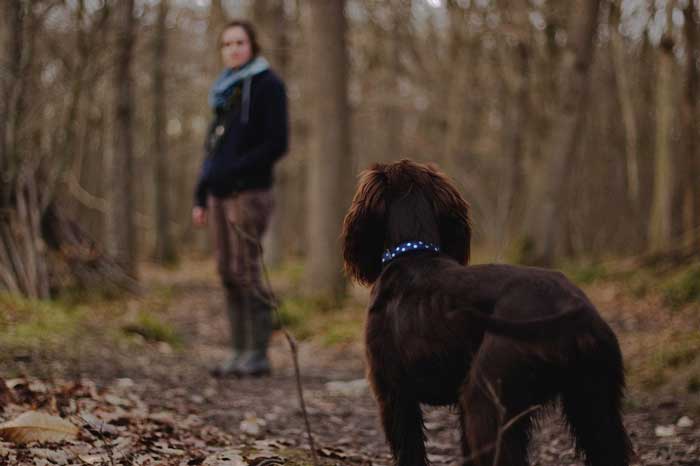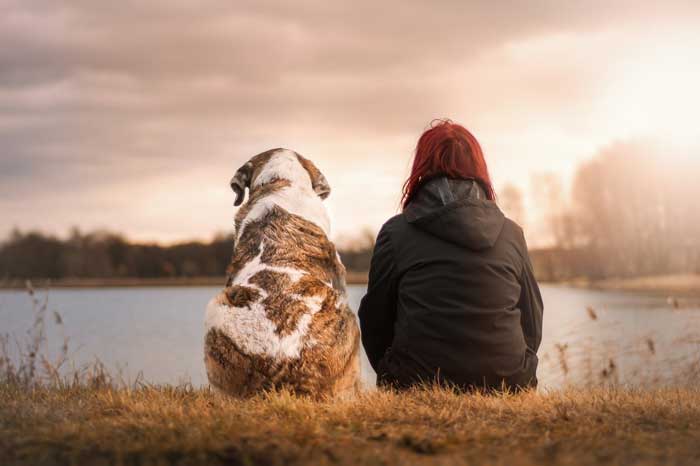A lot of new dog owners jump into the world of dogs head first, which always ends up with a wide variety of unnecessary problems.
However, such a problem can be easily averted if you take your time to learn more about the adjustment period of your new dog.
If you’re looking for some valuable tips for first-time dog owners, you’re in for a treat! In the following article, I’ll walk you through 14 tips that will help you make the most out of that period!
1. Learn More About the Dog’s Breed
When you get a new dog, whether it’s bought or adopted, make sure that you have all the basic information about its breed. There are over 300 to 400 breeds of dogs worldwide, each with its own set of traits and temperaments.
Learning about your chosen dog traits will make your first weeks of having a dog a lot smoother. Luckily finding valuable information about dog breeds is now a breeze!
For example, you can search the American Kennel Club (AKC) for information about your dog’s breed. If your dog is still a very young puppy, you’ll need to learn tons of information about the breed’s vaccinations, training, and more!
2. Dog Proof the House
Even before you bring your doggie in, you need to make sure that you dog-proof the house. There are countless things that are fine for us but are extremely toxic or hazardous to dogs.
Luckily, if you get your dog from a rescue center, they’ll most likely send a representative to check if your house is dog-friendly. Also, they can give you some advice on how to improve their safety for dogs.
Here’s a list of all the things you should store safely to keep the house secure for your little pooch:
- Human foods that are toxic to dogs
- Most cleaning products
- Medicines
- Portable heaters
- Wires and cables
- Toxic garden plants
- Weedkillers, pesticides, etc.
3. Always Stock Up on Essentials
While dealing with a new dog, the last thing you want to come across is a much-needed item that isn’t there.
If an experienced dog owner can handle it temporarily, it might cause a lot of problems for a newbie.
There are tons of dog products out there. Some of them are essential while others aren’t. Here’s a list of the critical things that you must have from day one:
- Comfortable dog bed
- Water and food bowls
- A Simple dog toy
- A traveling crate
- Anti-pulling aids (including leash, harness, etc.)
There are other tools that are also essential, such as dog grooming kits, and permanent identification microchips, and more. However, these items can wait for a few days until your dog starts to settle in.
4. Choose a Good Place for Your Dog to Sleep
Puppies are just like human newborns, you shouldn’t let them sleep in a separate room. Leaving a puppy alone can be dangerous for them too!
If you have a puppy, you should allow it to sleep in a crate next to you. Ideally, it should be in a quiet corner where you can keep a close eye on. After some time, you can encourage your dog to sleep anywhere else or in a separate room.
However, if you get an adult dog, they’re potty most likely house trained and won’t destroy things very quickly. This means that they can sleep just about anywhere quiet and safe.
There isn’t a right or wrong answer here as long as both you and your dog are satisfied with the sleeping spot.
5. A Good Vet Will Make Everything Easier
It goes without saying that finding a great vet is beyond crucial for a first-time dog owner. If you don’t know, a vet is usually the first place you’d want to visit with a new dog.
A vet can help you in a wide variety of aspects and questions you might have. Ideally, I’d recommend you pick a good vet even before you pick your pet itself!
Here are some tips I wish I’d have known before choosing my vet as a first-timer:
- Ask for recommendations from dog owners with real experience
- Arrange a first meeting with the vet to inquire about their approach in treatment
- Have a look around the clinic, cleanliness DOES matter
- The vet isn’t everything, check the rest of the clinic’s staff
6. Consider Pet Insurance
There might be some places where pet insurance is mandatory. However, even if it isn’t I’d recommend that you opt for one.
Pet insurance has a lot of advantages that make it an excellent decision. For example, It’ll help you save a lot of money in the long run.
Moreover, pet insurance encourages you to focus more on the well-being of your dog rather than the cost of the treatment.
7. Don’t Expect a Perfect Homecoming
A lot of first-time dog owners expect that their new pooch will be over the moon when it visits its new home, only to be disappointed by how anxious, scared, and overwhelmed the dog can be.
This is perfectly natural and happens in most cases. You’ll have to be patient and give your dog enough time to adjust to its new place, especially if it spent a long time in a dog shelter.
In fact, you might even want to use some calming methods, such as pheromone diffusers, chewing hemp, or anxiety jackets.
These products work in different mechanisms to help your dog calm down. They’re usually harmless for dogs, so they can be an excellent tool to help your dog get through the settling in period.
8. Feeding Your New Dog Can Be Tricky
A dog’s diet is the basis of its health and has a lot to do with how your dog ages. If you’ve never fed a dog before, you should learn about canine nutrition principles and the different types of dog food.
It depends on the age of your dog. For example, an adolescent or adult dog might be consuming a specific type of dog food. If that food is balanced, it’s fine to let your dog eat it, especially if your pooch likes it.
If you want to change your dog’s diet, or you have a new puppy, it’s better to contact your vet to give you the ideal dietary guidelines for your dog.
9. Keeping Your Dog Active Prevent Behavioral Issues

When a dog is acting up, it’s probably because they’re anxious, bored, or uncomfortable. In that situation, you have to check what’s wrong with your dog and fix it, especially if the dog has been acting fine before.
One of the things that new dog owners usually miss is the fact that dogs are extremely active creatures that can’t be locked up in a house.
Make sure that you take your dog out every now and then. Keeping your dog active means keeping it healthy.
This means that it’ll save you more money by cutting on the vet’s bill. Additionally, a more active dog is a lot calmer and well-behaved in the long run.
10. Keep a New Dog on a Leash
It’s always a great idea to let your dog roam freely and have a lot of fun while in a park. Yet, if you’re a new dog owner, you need to keep your dog on a leash for a lot of reasons.
With a leash, you’re protecting your dog, other dogs, and other people from any unprecedented situations that you might come across.
A new dog might not be too familiar with you, so it can easily run far and get lost, which can be very dangerous for everyone.
Also, you don’t have a solid idea about the dog’s behavior outdoors or the previous event in its life. Moreover, it might be regulated by the law to keep your dog on a leash all the time, so it’s better safe than sorry.
11. Don’t Shy from Asking for Help
A lot of people don’t like to admit that they need help, which always ends up creating more complicated problems.
Be aware that it’s perfectly fine to feel stuck or overwhelmed sometimes. If that happens, it’s perfectly okay to seek help from a professional or anyone with previous experience with a dog.
There are tons of dog owner communities, dog shelters, trainers, and other places where you can give you a helping hand.
12. Patience is Key While Training Your Dog
You might’ve opted for a certain breed because you like a specific trait about it. However, some special dog traits aren’t unlocked unless the dog is properly trained.
A well-structured training regimen will make both you and your dog a lot happier. It will also help you bond together, so you can take it to the next level.
Make sure that you specify some time of your day to train your dog. This includes basic disciplinary commands, which are important if you want to take your dog out freely.
However, you should also prepare for some behavioral problems.
In fact, even the most experienced dog owners will have to deal with some stubbornness and behavioral issues with their dogs. This is absolutely fine and will go away with patience and consistency in training.
The mild behavioral issues like destructive chewing or loud barking are easy to deal with the use of positive reinforcement techniques.
13. Start with Dog Potty Training
If you value your house cleanliness dearly (who doesn’t?), you should make sure that you start with a potty training schedule as soon as you possibly can. You’ll have to stick to this schedule by the minute to establish a solid training.
You might think it’s an extremely difficult process. However, it’s a very simple technique once you get the hang of it.
14. Limit The Dog’s Allowed Space in Your Home
If you live in a large house, it can be too overwhelming for your dog and might slow down their settling in time.
A pro tip here is to limit your dog to a couple of rooms in the house when they’re just settling in. this way they can get used to that space a lot quicker, which will help you pass this difficult stage easily.
After that, you might keep the room’s door open and give them a chance to wander around and explore at their own pace. This trick worked with most dogs I’ve trained!
Final Thoughts
Being a first-time dog owner and having a new pooch in the house is one of the best experiences you might ever have. However, this small period is a critical time with a lot of steps to take.
Owning a dog is a great commitment, but it will fill your life with fun, joy and affection.
So there you have it. A detailed list of 14 tips for first-time dog owners that will surely make your dog’s adjustment period a lot easier and more fruitful.

